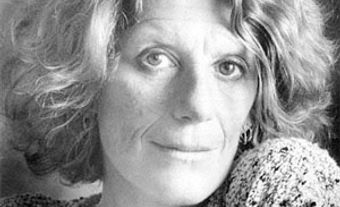Pintal, Lorraine
Lorraine Pintal, actor, director, and producer (b at Plessisville, Qué 24 Sept 1951). Current artistic director of the THÉÂTRE DU NOUVEAU MONDE, she made her stage debut with the company in 1973 in Mistero Buffo, directed by André BRASSARD. A graduate of the Conservatoire d'art dramatique that same year, she explored all facets of the profession: theatre, television, directing, and also, with the 1973 co-founding of la Rallonge where she played in the collectives (La Scouine, 1975; Pourquoi s'mett' tout nus, 1979), arts management.
At the turn of the eighties, her directing career took precedence over her acting. Among her notable productions are Marie Laberge's C'était avant la guerre à l'Anse à Gilles (Company Jean-Duceppe, 1981), Brecht's Dans la jungle des villes (La Rallonge, 1981) and Le Syndrome de Cézanne by Normand Canac-Marquis (La Rallonge, 1987), prize for best directing by l'Association québécoise des critiques de théâtre (AQCT). A versatile artist, all her talents were brought into play in the one-woman show Madame Louis 14 (La Rallonge, 1988), adapted from the writings of Mme de Maintenon, and for which Pintal assumed roles of scriptwriting, directing and performing. This work, presented on tour in Canada and in France, won best Québecois production at the Quinzaine internationale du theatre in 1990.
In 1992, she succeeded Olivier Reichenbach at the helm of the Théâtre du Nouveau Monde (TNM). In this new position of general manager and artistic director, she had the freedom to take on numerous challenges, including that of finally endowing the TNM with a worthy location. This founders' dream would materialize in 1997.
Her career path as a stage director continued, especially at the TNM, where she had already given solid readings of Réjean Ducharme's, HA ha !... (1990; best production from l'AQCT) and Inès Pérée et Inat Tendu (1991). Since then she mounted: Dubé's Les Beaux Dimanches (1993); Brecht's Jeanne Dark des Abbatoirs /St. Joan of the Stockyards (1994) ; Les oranges sont vertes (1998 ; Masque for best production, Montréal), L'Asile de la pureté (2004) by Gauvreau ; and Ducharme's L'Hiver de force (2002). For other companies she did Hosanna (Théâtre de Quat'Sous, 1991; best staging and best production from l'AQCT) and Les Femmes savants/Learned Ladies (Nouvelle Compagnie Théâtre, 1990); and the operas Le Vampire et la Nymphomane (Chants Libres, 1996) and Wozzeck (Orford Arts Centre/Orchestre Métropolitain du Grand Montréal/TNM, 2004-2006). To date she has directed more than fifty productions.
Although she championed television roles, she would have more impact on the small screen as a producer in Mia Riddez' Le Grand Remous (1988-90), Montréal P.Q. (1990-92) by Victor-Lévy Beaulieu on Radio-Canada, and the television plays Hosanna (1991), Tartuffe (1997) and Bilan (2002).
In 2001, she won the National Theatre School's Gascon-Thomas Award given to outstanding figures in Canadian theatre. She is a member of the Order of Canada.

 Share on Facebook
Share on Facebook Share on X
Share on X Share by Email
Share by Email Share on Google Classroom
Share on Google Classroom

